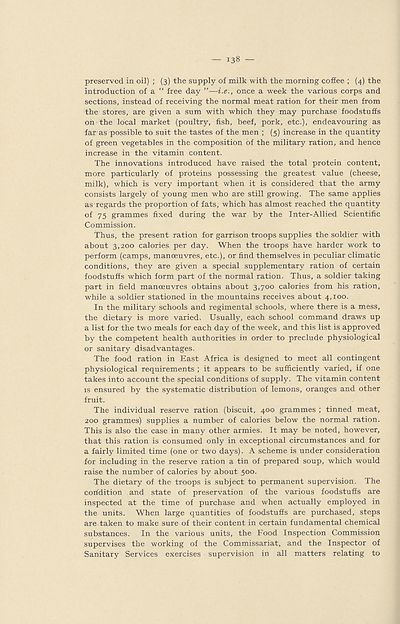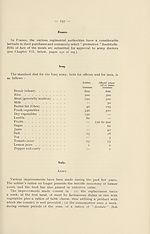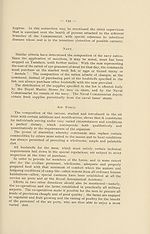Download files
Complete book:
Individual page:
Thumbnail gallery: Grid view | List view

— 138 —
preserved in oil) ; (3) the supply of milk with the morning coffee ; (4) the
introduction of a “ free day ”—i.e., once a week the various corps and
sections, instead of receiving the normal meat ration for their men from
the stores, are given a sum with which they may purchase foodstuffs
on the local market (poultry, fish, beef, pork, etc.), endeavouring as
far as possible to suit the tastes of the men ; (5) increase in the quantity
of green vegetables in the composition of the military ration, and hence
increase in the vitamin content.
The innovations introduced have raised the total protein content,
more particularly of proteins possessing the greatest value (cheese,
milk), which is very important when it is considered that the army
consists largely of young men who are still growing. The same applies
as regards the proportion of fats, which has almost reached the quantity
of 75 grammes fixed during the war by the Inter-Allied Scientific
Commission.
Thus, the present ration for garrison troops supplies the soldier with
about 3,200 calories per day. When the troops have harder work to
perform (camps, manoeuvres, etc.), or find themselves in peculiar climatic
conditions, they are given a special supplementary ration of certain
foodstuffs which form part of the normal ration. Thus, a soldier taking
part in field manoeuvres obtains about 3,700 calories from his ration,
while a soldier stationed in the mountains receives about 4,100.
In the military schools and regimental schools, where there is a mess,
the dietary is more varied. Usually, each school command draws up
a list for the two meals for each day of the week, and this list is approved
by the competent health authorities in order to preclude physiological
or sanitary disadvantages.
The food ration in East Africa is designed to meet all contingent
physiological requirements ; it appears to be sufficiently varied, if one
takes into account the special conditions of supply. The vitamin content
is ensured by the systematic distribution of lemons, oranges and other
fruit.
The individual reserve ration (biscuit, 400 grammes ; tinned meat,
200 grammes) supplies a number of calories below the normal ration.
This is also the case in many other armies. It may be noted, however,
that this ration is consumed only in exceptional circumstances and for
a fairly limited time (one or two days). A scheme is under consideration
for including in the reserve ration a tin of prepared soup, which would
raise the number of calories by about 500.
The dietary of the troops is subject to permanent supervision. The
coifdition and state of preservation of the various foodstuffs are
inspected at the time of purchase and when actually employed in
the units. When large quantities of foodstuffs are purchased, steps
are taken to make sure of their content in certain fundamental chemical
substances. In the various units, the Food Inspection Commission
supervises the working of the Commissariat, and the Inspector of
Sanitary Services exercises supervision in all matters relating to
preserved in oil) ; (3) the supply of milk with the morning coffee ; (4) the
introduction of a “ free day ”—i.e., once a week the various corps and
sections, instead of receiving the normal meat ration for their men from
the stores, are given a sum with which they may purchase foodstuffs
on the local market (poultry, fish, beef, pork, etc.), endeavouring as
far as possible to suit the tastes of the men ; (5) increase in the quantity
of green vegetables in the composition of the military ration, and hence
increase in the vitamin content.
The innovations introduced have raised the total protein content,
more particularly of proteins possessing the greatest value (cheese,
milk), which is very important when it is considered that the army
consists largely of young men who are still growing. The same applies
as regards the proportion of fats, which has almost reached the quantity
of 75 grammes fixed during the war by the Inter-Allied Scientific
Commission.
Thus, the present ration for garrison troops supplies the soldier with
about 3,200 calories per day. When the troops have harder work to
perform (camps, manoeuvres, etc.), or find themselves in peculiar climatic
conditions, they are given a special supplementary ration of certain
foodstuffs which form part of the normal ration. Thus, a soldier taking
part in field manoeuvres obtains about 3,700 calories from his ration,
while a soldier stationed in the mountains receives about 4,100.
In the military schools and regimental schools, where there is a mess,
the dietary is more varied. Usually, each school command draws up
a list for the two meals for each day of the week, and this list is approved
by the competent health authorities in order to preclude physiological
or sanitary disadvantages.
The food ration in East Africa is designed to meet all contingent
physiological requirements ; it appears to be sufficiently varied, if one
takes into account the special conditions of supply. The vitamin content
is ensured by the systematic distribution of lemons, oranges and other
fruit.
The individual reserve ration (biscuit, 400 grammes ; tinned meat,
200 grammes) supplies a number of calories below the normal ration.
This is also the case in many other armies. It may be noted, however,
that this ration is consumed only in exceptional circumstances and for
a fairly limited time (one or two days). A scheme is under consideration
for including in the reserve ration a tin of prepared soup, which would
raise the number of calories by about 500.
The dietary of the troops is subject to permanent supervision. The
coifdition and state of preservation of the various foodstuffs are
inspected at the time of purchase and when actually employed in
the units. When large quantities of foodstuffs are purchased, steps
are taken to make sure of their content in certain fundamental chemical
substances. In the various units, the Food Inspection Commission
supervises the working of the Commissariat, and the Inspector of
Sanitary Services exercises supervision in all matters relating to
Set display mode to:
![]() Universal Viewer |
Universal Viewer | ![]() Mirador |
Large image | Transcription
Mirador |
Large image | Transcription
Images and transcriptions on this page, including medium image downloads, may be used under the Creative Commons Attribution 4.0 International Licence unless otherwise stated. ![]()
| League of Nations > Economic and financial section > Problem of nutrition > (140) |
|---|
| Permanent URL | https://digital.nls.uk/190925582 |
|---|
| Shelfmark | LN.II |
|---|
| Description | Over 1,200 documents from the non-political organs of the League of Nations that dealt with health, disarmament, economic and financial matters for the duration of the League (1919-1945). Also online are statistical bulletins, essential facts, and an overview of the League by the first Secretary General, Sir Eric Drummond. These items are part of the Official Publications collection at the National Library of Scotland. |
|---|---|
| Additional NLS resources: |
|

